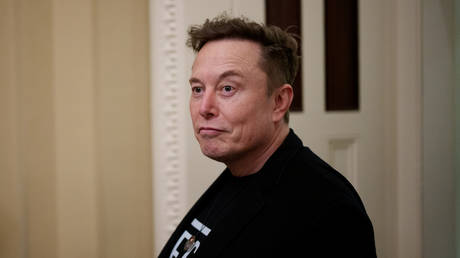Why There Isn’t a Stronger Global Response to Trump’s Tariffs
Other nations face the ‘prisoner’s dilemma’ as they consider their responses.

However, aside from China and a few isolated reactions from allies, the overall response has been notably cautious. International officials are discussing "calibrated" responses and maintaining a “cool head,” with some clearly hoping that diplomacy will convince Trump to reconsider his tariffs.
In discussions with diplomats, economists, and former U.S. officials, I inquired about the rationale behind this measured approach. Weren’t they worried that such a tepid global reaction might not be enough to prompt Trump to alter his stance, or even encourage him to be more aggressive?
Experts suggested several reasons why many governments are refraining from quick, collective action. A significant factor is the historical difficulty countries have in mobilizing for united action, as many believe they can achieve better outcomes for themselves by avoiding an escalation of hostilities with Trump.
Moreover, there’s no certainty that actions taken by other nations would deter Trump’s fixation on tariffs.
Trump has advocated for tariffs for years, stemming from his long-standing belief that trade deficits indicate that other countries are taking advantage of the United States, despite this misconception concerning how trade deficits function. Countries had ample time to prepare for Trump’s tariffs, working on their own strategies for retaliatory measures.
Yet in his second term, Trump seems focused on a much larger goal: fundamentally restructuring the U.S. economy.
This appears to be a matter of legacy for him. Unlike before, he seems less affected by declining stock prices and has indicated that Americans should expect short-term discomfort, perhaps even a recession, while suggesting that history will ultimately vindicate him.
The reality is that when it comes to Trump today, “We don’t know what the pain threshold is,” stated Brian Gardner, chief Washington policy strategist for Stifel Financial. Whatever that threshold is, it is “significantly higher than people had previously estimated.”
The U.S. economy is both expansive and diverse, allowing it to absorb significant shocks — meaning the repercussions of these tariffs could take time to manifest.
What if the pain were to stem from a coalition of nations — governments strategizing to impact the U.S. economy collectively? Would that give Trump pause?
While it’s an appealing notion, experts deemed it unrealistic. Governments often struggle to unite in action, even against a common adversary.
Each nation prioritizes its own interests and tends to distrust others, akin to the classic “prisoner’s dilemma.” Recall the minimal global solidarity evident during the early stages of the Covid-19 pandemic as countries scrambled to secure medical supplies.
The European Union stands out as a notable exception in terms of trade responses; it is preparing at least two sets of retaliatory tariffs, albeit spaced out in anticipation of potential negotiations. However, other alliances have yet to form to confront Trump’s tariffs.
There were speculations that China might coordinate its response with Japan and South Korea, but given the historical tensions among those nations, the idea was largely dismissed. On Friday, China announced unilateral retaliatory tariffs of 34 percent across the board.
Many countries are still examining the specifics of Trump’s tariffs but have accepted that there will be tariffs imposed globally. Consequently, they’re also considering how to negotiate a more favorable deal.
“I can’t be the last one to reach a deal with Trump, because if I’m the last one, then I'm the one who's going to get screwed,” remarked a foreign diplomat, speaking anonymously to address this sensitive issue. “If I’m the first one to reach the deal, then it might be the most advantageous possible thing, and I’ll be better off compared to other countries,” he continued, highlighting the competitive aspect of this negotiation.
A former Trump administration official indicated that there’s a feeling among some foreign officials of relief that the tariffs have been milder than anticipated, even if still quite high.
Affected nations “think they can, basically, over the next couple months, quietly negotiate. They’ll make a couple of concessions, maybe on trade, maybe on defense, maybe on other things, and things will get adjusted,” noted the former official.
Canada and Mexico represent critical cases as various nations weigh their options.
Trump has already imposed tariffs on Canada and Mexico, two of the U.S.'s primary trading partners. These nations are not facing new duties from the extensive tariff regime announced this week, although future duties could still be on the table. Thanks to the USMCA trade agreement, they have secured several exemptions from the tariffs.
For Canada and Mexico to join forces with others for retaliation is risky, as Trump could escalate against them further. A more prudent approach may involve negotiating additional exemptions over time while waiting out Trump.
Prime Minister Mark Carney declared that Canada would implement “carefully calibrated and targeted counter tariffs.” Already, the country has introduced 25 percent tariffs on U.S. autos to counter a set of tariffs enacted by Trump this week.
The U.S. also has leverage over numerous countries in various areas beyond trade, and Trump has shown a willingness to blur these lines — even with close allies like Canada, threatening to withdraw from security cooperation based on unrelated trade disputes.
China's distinct response can be attributed to its position as a major trading partner and a top national security competitor. Beijing acknowledges it possesses considerable leverage, which may explain its decision to impose retaliatory tariffs.
However, the Trump administration has cautioned other nations against escalating their responses. The president’s immediate reaction to China’s tariffs was, “CHINA PLAYED IT WRONG, THEY PANICKED — THE ONE THING THEY CANNOT AFFORD TO DO!” he stated on social media.
Trump remains largely unfazed by predictions of dire consequences resulting from his actions. This is partly because, too often, disastrous outcomes fail to materialize—at least not in their entirety.
When he instituted immigration and travel restrictions during his first term, there were minimal significant reciprocal measures taken by other countries against American citizens. His acknowledgment of Jerusalem as Israel’s capital did not provoke widespread chaos in the Middle East. Abandoning the Iran nuclear deal did not immediately trigger Tehran to develop a nuclear weapon, though it certainly progressed toward that point.
Each of these decisions has incurred costs, including a degradation of trust between the U.S. and its allies. Often, the repercussions of such actions remain unclear for years. Yet, the lesson Trump appears to have assimilated is that he can push boundaries—even dismantle established norms—without facing severe fallout.
As nations deliberate on their responses, it may not be Trump’s pain threshold that matters most, but rather that of his fellow Republicans, especially those in Congress who can halt or reverse these tariffs. At what point will they feel enough pressure from their constituents, particularly concerning their diminishing savings, to challenge the president?
Regardless of when that moment arrives, it is certain that one of the biggest casualties of Trump’s trade war will be the faith of other nations in America as a stable and trustworthy pillar of global trade.
Frederick R Cook for TROIB News
Find more stories on Business, Economy and Finance in TROIB business












